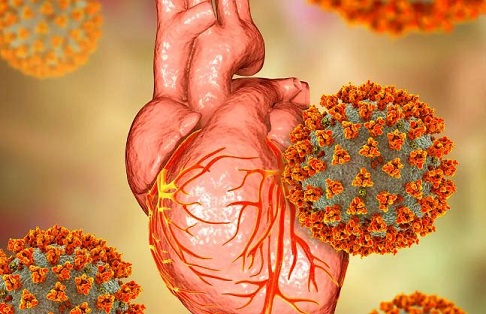Nikhil Prasad Fact checked by:Thailand Medical News Team Aug 01, 2024 1 year, 5 months, 1 week, 6 days, 1 hour, 50 minutes ago
Medical News: A groundbreaking study conducted by researchers from the University of Cambridge has unveiled crucial insights into the persistent heart issues experienced by individuals recovering from COVID-19. This research covered in this
Medical News report, provides a comprehensive analysis of the long-term cardiac complications linked to COVID-19, highlighting the role of immune dysregulation in these issues.
 Persistent Heart Issues In Post COVID Linked To Immune Dysregulation
Study Background
Persistent Heart Issues In Post COVID Linked To Immune Dysregulation
Study Background
While acute cardiovascular complications of COVID-19 are well-documented, the long-term effects on the heart have remained elusive. Many patients report lingering cardiac symptoms long after recovering from the initial infection, prompting researchers to investigate further. The team, comprising experts from the Section of Cardiorespiratory Medicine, Department of Medicine, University of Cambridge, and the Department of Radiology, Cambridge University Hospitals NHS Trust, aimed to uncover the immune profiles associated with these unexplained cardiac injuries.
Methodology
The study involved 21 participants, with an average age of 47 years, of whom 71% were female. These individuals had long COVID symptoms, elevated troponin levels, or new-onset heart failure, yet had no pre-existing heart conditions or recent steroid treatments. On average, the participants were enrolled 346 days after their initial COVID-19 infection. The study was prospective and observational, focusing on the correlation between cardiac MRI findings and immune dysregulation.
Each participant underwent a cardiac MRI to identify any structural or functional heart abnormalities. In parallel, blood samples were collected for deep immunophenotyping, a technique that provides a detailed analysis of immune cell subsets and inflammatory markers. This dual approach allowed the researchers to correlate specific immune responses with observed cardiac anomalies.
Key Findings
The study's findings reveal significant insights into the long-term cardiac effects of COVID-19:
-MRI Abnormalities: Cardiac MRI scans showed that 43% of the participants had detectable abnormalities. These included non-ischaemic patterns of late gadolinium enhancement (LGE), indicative of fibrosis, and myocardial edema, suggesting inflammation. These abnormalities were consistent with myocarditis-like injury, which is inflammation of the heart muscle not caused by coronary artery disease.
-Immune Dysregulation: Participants with MRI abnormalities (referred to as MRI(+)) displayed distinct immune profiles compared to those without abnormalities (MRI(-)). Notably, MRI(+) individuals had higher levels of specific inflammatory markers such as CCL3, CCL7, FGF-23, and CD4 Th2 cells, and lower levels of CD8 T effector memory (TEM) cells.
-Predictive Markers: The study identified CCL7 and CD8 TEM cells as the most significant predictors of MRI
-detectable cardiac abnormalities. CCL7, a chemokine involved in immune cell recruitment, was particularly associated with diffuse myocardial fibrosis and edema.
Detailed Insights
Delving deeper into the immune analysis, the researchers found that MRI(+) individuals had lower expression of inhibitory receptors PD1 and TIM3 on CD8 TEM cells. This reduced expression may indicate a dysfunctional regulatory mechanism, potentially leading to uncontrolled immune activity that damages cardiac tissue.
Furthermore, functional assays showed that CD8 T cells from MRI(+) patients had a higher capacity to produce cytotoxic granzyme B upon stimulation, highlighting a possible pathway for ongoing cardiac injury.
The detailed immune profiling also revealed elevated levels of CD4 Th2 cells in MRI(+) patients. These cells are typically associated with allergic responses and help modulate the immune system. Their increased presence suggests a skewed immune response, potentially contributing to chronic inflammation in the heart.
Implications and Future Research
The study's findings underscore the critical role of immune dysregulation in long COVID-related cardiac issues. Understanding these mechanisms is vital for developing targeted treatments for patients suffering from persistent heart symptoms post-COVID-19. The identification of CCL7 and CD8 TEM cells as predictive markers opens new avenues for diagnostic and therapeutic interventions.
Future research should focus on larger cohort studies to validate these findings and explore the potential for using these immune markers in clinical practice. Additionally, longitudinal studies could help determine the long-term trajectory of cardiac health in COVID-19 survivors and identify the most effective strategies for managing these patients.
Conclusion
This pioneering study provides essential insights into the persistent cardiac complications associated with long COVID. By integrating advanced cardiac imaging with deep immunophenotyping, the researchers have highlighted the significant role of immune dysregulation in these issues. These findings pave the way for future research aimed at improving the diagnosis and treatment of long COVID patients with cardiac symptoms.
The study findings were published in the peer-reviewed journal: Cardiovascular Research.
https://academic.oup.com/cardiovascres/advance-article/doi/10.1093/cvr/cvae159/7723296
For the latest COVID-19 News, keep on logging to Thailand
Medical News.
Read Also:
https://www.thailandmedical.news/news/a-new-genetic-discovery-in-covid-19-complications-the-role-of-ankyrin-2-in-ventricular-tachycardia
https://www.thailandmedical.news/news/breaking-covid-19-increases-risk-of-heart-tumors-including-cardiac-myxomas-and-myxofibrosarcomas
